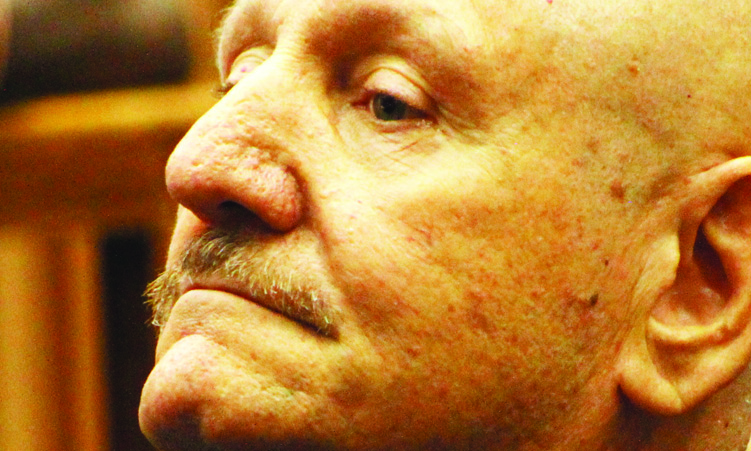… sentenced to life imprisonment
Ernst Lichtenstrasser’s “violent, irrational and unpredictable behaviour” shows he is a danger to society.
Because of this, together with a lack of remorse shown by Lichtenstrasser and the fact that he committed two premeditated murders, the most severe sentence that can be imposed on him is justified and appropriate, judge Christie Liebenberg said before he sentenced Lichtenstrasser (62) to two terms of life imprisonment yesterday.
Liebenberg said the murder of Namibian Institute of Mining and Technology (Nimt) executive director Eckhart Mueller (72) and his deputy, Heimo Hellwig (60), on 15 April 2019 was a “brazen, merciless execution” that was unjustified and extreme, and for that reason Lichtenstrasser did not deserve mercy with his sentencing.
Liebenberg convicted Lichtenstrasser on two counts of murder and six further charges near the start of November last year.
Five of the charges are linked to the murder of Mueller and Hellwig, who were gunned down at the Nimt head office at Arandis in the Erongo region in the morning of 15 April 2019.
Lichtenstrasser, who was a Nimt employee before his arrest a day after the double murder, was also convicted on three charges connected to the theft of a shotgun from a gunsmith at Grootfontein during the second half of 2016, and the supply of that firearm to an employee of his in northern Namibia.
Lichtenstrasser denied guilt on all eight charges during his trial, which started in February 2021.
During the sentencing yesterday, Liebenberg said Lichtenstrasser did not take the court into his confidence during his trial and presentence proceedings that followed on the court’s verdict.
Liebenberg stated: “Instead, he continued proclaiming his innocence and denied any involvement in the crimes, claiming to have been falsely incriminated by the investigating team who concocted evidence implicating him as the culprit – despite condemning forensic evidence proving a direct link between him and the crime scene.
“He throughout persisted with the stance that he was at the wrong place at the wrong time. In the end, he blamed the court for infringing on his right to a fair trial.”
The judge continued: “The evil deeds the accused stands convicted of undoubtedly adversely reflect on [his] character.”
MOTIVE
Liebenberg recounted that Lichtenstrasser was disgruntled about a decision of the Nimt management to transfer him from Tsumeb, where he was working, to Keetmanshoop.
The motive for the murders appears to have been that he wanted to eliminate Mueller, who stood by the decision to transfer Lichtenstrasser, and that Hellwig was also killed because he was at the scene when Mueller was shot.
That is evident from a confession that Lichtenstrasser made about a month after his arrest, the judge said.
He commented: “It is my considered view that such violent, irrational and unpredictable behaviour renders the accused a danger to society. Society, in turn, may therefore legitimately expect protection from this court against the accused.”
Liebenberg also recounted that Lichtenstrasser displayed irrational behaviour while in police custody after his arrest and during his trial by going on hunger strikes and trying to end his life through an overdose of medication after he had been convicted.
“What is evident from [Lichtenstrasser’s] conduct is to what extremes he is willing to go to assert himself. It would appear that not only is the accused a threat to society, he is also a danger to himself,” he said.
Liebenberg sentenced Lichtenstrasser to life imprisonment on each of the two murder charges.
Lichtenstrasser was also sentenced to three years’ imprisonment on a charge of possession of a firearm without a licence, a one-year jail term for possession of ammunition without a licence, and four years’ imprisonment on a count of attempting to defeat or obstruct the course of justice.
In connection with the theft of the shotgun from a gunsmith at Grootfontein, he was sentenced to a four-year prison term on a charge of theft, three years’ imprisonment for possession of a firearm without a licence, and a one-year jail term for the unauthorised supply of a firearm and ammunition.
In terms of the Correctional Service Act of 2012, all of the other prison terms will be served concurrently with the sentence of life imprisonment.
A regulation issued in terms of the act also stipulates that someone sentenced to life imprisonment becomes eligible to be considered for release on parole or probation after serving a period of at least 25 years in prison, without committing or being convicted of any crime or offence during that period.
In addition to the prison terms he handed to Lichtenstrasser, Liebenberg declared him unfit to possess a firearm for a period of five years, starting after he has been released from prison.
Deputy prosecutor general Antonia Verhoef represented the state during the trial, which started in February 2021.
Lichtenstrasser was represented by legal aid lawyer Albert Titus until he was found guilty, after which he ended Titus’ services.
He did not have legal representation in the last phase of his trial after that point.
Stay informed with The Namibian – your source for credible journalism. Get in-depth reporting and opinions for
only N$85 a month. Invest in journalism, invest in democracy –
Subscribe Now!






